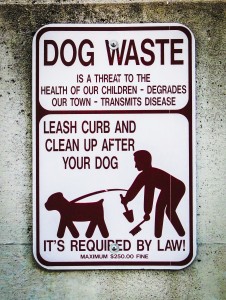Why Scoop the Poop? More Than a Matter of Cleanliness
 It seems dog parks, community parks, and sidewalks can be dangerously rife with dog poo. We have to shake our heads and wonder why some owners just can’t seem to scoop the poop. Aside from the disgusting experience of stepping in a fresh pile, there are numerous health reasons for cleaning up after our pets.
It seems dog parks, community parks, and sidewalks can be dangerously rife with dog poo. We have to shake our heads and wonder why some owners just can’t seem to scoop the poop. Aside from the disgusting experience of stepping in a fresh pile, there are numerous health reasons for cleaning up after our pets.
Health Reasons for Cleaning Up Pet Waste
Although the task is a stinky one, cleaning up after a pet is a necessary part of being a responsible pet owner. It also helps minimize the spread of illnesses and parasites, some of which can be transmitted to humans as well (i.e., zoonotic).
Not surprisingly, there are several problems with leaving your pet’s feces around. The following can be traced back to contact with feces of an infected animal:
- Parvovirus
- Parasitic worms: hookworm, whipworm, roundworms (zoonotic)
- Giardia (zoonotic)
- Coccidia
- Leptospirosis (zoonotic)
- Salmonella (zoonotic)
- E. coli (zoonotic)
- Cryptosporidiosis (zoonotic)
As you can see, cleaning up pet feces is not only proper etiquette, it’s a public health necessity.
Scoop the Poop! Disease Prevention Tips
Now let’s focus on prevention. Scooping the poop is certainly one of the most obvious ways of stopping the spread of disease, but what are some other preventive measures you can take? Here are some useful practices that go beyond the pooper-scooper:
- Always carry extra waste disposal bags when traveling with your pet (keep a stash in the car, in your purse, and with your pet supply bag).
- Keep your pet on a monthly parasite preventive.
- If your pet has not been vaccinated against Leptospirosis, ask your veterinarian if this would be beneficial.
- Follow up with annual vaccinations.
- Keep the backyard clean; dispose of waste in a sealed bin or garbage bag for trash collection.
- Clean your cat’s litter box frequently (we recommend daily).
- When walking your dog, prevent him or her from investigating feces or urine from any animal, domestic or wild.
- Keep parks and local areas free of waste by raising awareness and organizing clean-ups.
- Keep small children away from animal waste.
- Practice good hygiene and wash hands thoroughly after cleaning the litter box or backyard.
- Cover your child’s sandbox when not in use (outdoor cats might use them otherwise).
To ensure the health of your pet, use the first and most important line of defense: prevention. This includes parasite screenings, deworming, vaccinations, and regular preventives. Please contact us with additional questions or concerns.


